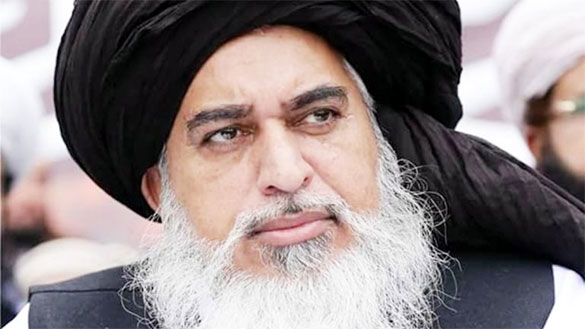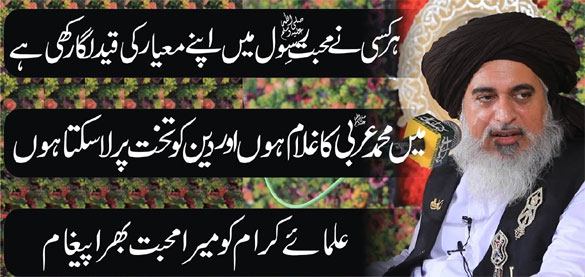
By Arshad Alam, New Age Islam
25 November 2020
Khadim Husain Rizvi, who suddenly collapsed and died, had the dubious credential of heaping insults on those with whom he disagreed. One such insult was heaped on Abdul Sattar Edhi, the now deceased Pakistani philanthropist, whose foundation runs the world’s largest ambulance network. In an irony, which would have been lost on Khadim Husain had he been alive, the man was rushed to a nearby hospital in an Edhi Foundation ambulance. But this cleric, who rose from being a petty state official to one of the most important mobilisers of religious passion in recent times, not just insulted others. He threatened all those whom he thought had disrespected the Prophet and rallied to further strengthen the already infamous blasphemy laws. In short, he weaponised Islam and in the process, Barelwis themselves.
Barelwis were long considered moderate Muslims which the west was happy to fund and showcase. This myth got busted in Pakistan when a Barelwi got up and shot dead Salman Taseer, the governor of Punjab. His fault? He was campaigning for the release of Asiya Bibi, a Christian women, jailed on the charges of blasphemy. As the Barelwi logic goes, anyone who defends a ‘blasphemer’ becomes one himself. And the same punishment should be meted out to him, which is to kill him. A conscientious Muslim, Mumtaz Qadri, whose professional duty was to protect Salman Taseer, pumped 27 bullets in him. One of those who had inspired Qadri was Khadim Husain, who being a Barelwi ideologue had been campaigning against Taseer. After Qadri was arrested (and later hanged), Khadim Husain launched a movement to free this killer, arguing that Qadri had done nothing wrong; what he did was in accordance with the teachings of Islam. After he was hanged, Qadri was declared as a Ghazi or a holy warrior by the same Khadim Husain and millions of his followers.

Having thus made a name for himself as the most important Ashik e Rasul, Khadim Husain set about to organise the Barelwis as a potent political force. It is true that in the past, the Barelwis have been the target of numerous terror groups in Pakistan. Wrongly understood as lax Muslims, their mosques, shrines and even some of the leadership had been bombed out of existence by groups like the Taliban, who, being Deobandis, detest Muslims going to shrines. Despite being the numerical majority, the Barelwis found themselves not only singled out for targeted killings but also out of structures of power. Khadim Husain, by taking up issues like the protection of blasphemy laws, gave voice to this beleaguered majority who were now tasting power after many years. The man and his followers had the power to bring Islamabad to a halt, bring the government to its knees and even ask the all-powerful military establishment to negotiate with the government regarding their religious demands.
But as with many sectarian movements, the Barelwis’ assertion of power must necessarily be against a perceived enemy. That enemy can may be the secular state, the Deobandis, the Ahmadiya Muslims or the Shia. And we saw this through the person of Khadim Husain whose many speeches against the Ahmadiya and Shia make them vulnerable minorities within their own country. Anyone who thinks of Barelwis as the moderates within Islam must ask the Ahmadiya and the Shia what they think of this movement within Pakistan.
But then Khadim Husain should not be held solely responsible for this anti Shia vituperative rhetoric. In many ways he was being true to the Barelwi teachings which have for long held the Shia to be astray and treated the Ahmadiyas beyond the pale of Islam. The foundational texts of the Barelwis, as represented through the writings of Ahmad Riza Khan, themselves are responsible for much of the scorn that is poured on these so called deviant sects. In their love for the prophet, the Barelwis declared anyone who did not follow their interpretation of Islam as Kafir. More nearer to our history, the Barelwis were the first to raise the issue of blasphemy in the wake of the publication of Salman Rushdie’s book. Other protesting sects were just following the lead of the Barelwis.
It also must be said that in the context of Pakistan, various religious sects have been used against each other for many decades now. There was a time when the Deobandis and the Ahle Hadis were the favourite of Pakistani establishment, as they could be used in Afghanistan against the Soviets.

The sudden visibility of these scriptural sects was not because of the purported superiority of their Islamic interpretation but more so because the state had started to patronise them, thereby giving them more visibility as compared the Barelwis. It is not improbable that forces within the Pakistani deep state now think that courting the Barelwis will be beneficial for them and that’s why we are seeing this sect occupying the Pakistani streets.
Khadim Husain, though responsible for giving a sense of purposive militancy to the Barelwis might also have been an unconscious player in someone else’s strategic game. Whatever be the reason behind this, what is clear is that the path on which he has herded his followers does not lead to tolerance and religious ecumenism but only towards bigotry and violence in the name of religion.
-----
Arshad Alam is a NewAgeIslam.com columnist.

No comments:
Post a Comment